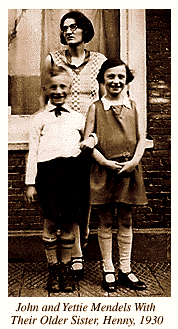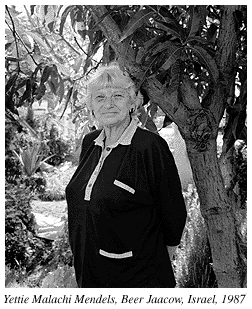
Yettie stayed with this family several more months until the woman's husband and son returned from the concentration camp and there was no longer room for her. She took a job as a live-in maid with another family for the next four months. A few days after she settled in with this family, while cleaning a bedside table drawer, she discovered she was living with Dutch National Socialists--Nazis. She asked a clergyman who knew her situation what she should do. "Stay there!" he told her. "It's the safest place you could be."
I stayed with that family, knowing that they were N.S.B.'ers, until late in September 1944. I wasn't too nervous about the situation. However after the Battle of Arnhem , on the 17th of September, they began to be nervous themselves. One day the son-in-law came to me.
"I know you are in the underground. I have something I want to give you," he said, and he showed me a gun and two hand grenades. "If you want more, I can get them."
"No, I don't want these things. I wouldn't know what to do with them." I denied being in the underground, which was the truth.
"It doesn't matter. I'll leave them under the shrubs in the garden, and you can do whatever you want." Later I took them out and brought them to a church where I knew the priest. I soon left that family.
I left because the doctor in Huizen, Dr. van den Berg, asked me to work for him in a little hospital he had opened for the Dutch refugees coming up from the south after the Battle of Arnhem. Before the war I had studied nursing and I much preferred doing that to being a maid. I lived at the hospital with a refugee couple from the south. The wife did the cooking, and her husband was the handyman. I was the nurse.

Dr. Van den Berg's whole attitude was special. I never felt that he was doing me a favor. As a doctor he had plenty of responsibilities besides helping Jews, and doing other forbidden things, but he was always friendly; I never heard a cross word. He and Bert Bochove, who was his good friend, had many things in common: they were both outgoing men. Like Dr. Van den Berg, Bert never gave you the feeling that you were a burden to him. When I think of Bert, I always remember a big smile. I'm sure he had quite a bit to not smile about. I don't think his life has been easy.
 The hospital was quite near to Bochove's store, on the same street. I didn't visit too often because I was very busy, but I did walk past the pharmacy every day and would stop to say hello to Bert, Annie, Ans and Henny, while Henny was still there. When Henny and Pam moved to the little house in the woods I could visit her much more often. Because of my hospital work, I had a bicycle, and even a pass to go out after the 8 o'clock curfew.
The hospital was quite near to Bochove's store, on the same street. I didn't visit too often because I was very busy, but I did walk past the pharmacy every day and would stop to say hello to Bert, Annie, Ans and Henny, while Henny was still there. When Henny and Pam moved to the little house in the woods I could visit her much more often. Because of my hospital work, I had a bicycle, and even a pass to go out after the 8 o'clock curfew.
Henny and I were always very close. She was already twelve years old when I was born, so she became my role model of how I thought I should be. I didn't resent her because of that, on the contrary, I admired her very much.
During the war I think she wanted to help me more than circumstances allowed. Her daughter Marion was born only four months after I gave birth to my boy, but Marion was never separated from her parents. They had their child and I did not have mine. I felt that Henny understood me, that she felt my pain even more than I felt it myself, because I am very good at pushing away the things that hurt. Henny wasn't like that. I think her character was much stronger than mine.
Yettie stayed at Dr. van den Berg's hospital until the end of the war in May 1945, after which she remained in Huizen for another year, attempting to make her life normal again. It took several months of searching to trace the whereabouts of her son, who was by then two-and-a-half years old. As time went by, she learned the sad fate of her husband and the other family members. In 1951, she visited Israel as a participant in a short-term nursing program, and decided to stay. Today she lives in a pleasant suburban setting, a short walk from the hospital where she has worked for more than thirty years.
 YETTIE MENDELS: My way to learn about something, to understand it, is to read about it in a book. You know, I have plenty of books about the Holocaust, but no matter how much you read about it, you still can't understand it--you can't understand what people went through; you can't have their experiences. I went through a lot, but to not make it through, that horror I have not experienced. My family members who died in the camps have gone through it, I have not.
YETTIE MENDELS: My way to learn about something, to understand it, is to read about it in a book. You know, I have plenty of books about the Holocaust, but no matter how much you read about it, you still can't understand it--you can't understand what people went through; you can't have their experiences. I went through a lot, but to not make it through, that horror I have not experienced. My family members who died in the camps have gone through it, I have not.
I have talked these things over with Henny, but never with Ans. She can't. I always want to hear about it, to read about it, to talk, but Ans is exactly the opposite. She doesn't want to hear about it. Never, never, never. If I start to say something like, "You know, Father...," she says, "No! Don't tell me, don't speak!" Henny and I often talk about Father, about his sense of humor, about his wisdom, about things he did or said. We remember him. I told Ans, "I don't understand why you can't talk about him. They had to live through this. They had to endure it to the end. The least we can do is identify with them."
I came to Israel because I couldn't live in Holland anymore; I was living among ghosts. Everywhere I went I imagined I saw this one, or that one, or that one. Many of my friends married during the war, as I did, but none of them survived. Of my friends, of my family, not one is alive; I have no friends from my childhood. I didn't find out all at once. Slowly, over the years you find out who didn't come back.
Yettie Malachi Mendels gave this interview in 1987, at her home in Beer-Jaacow, Israel.